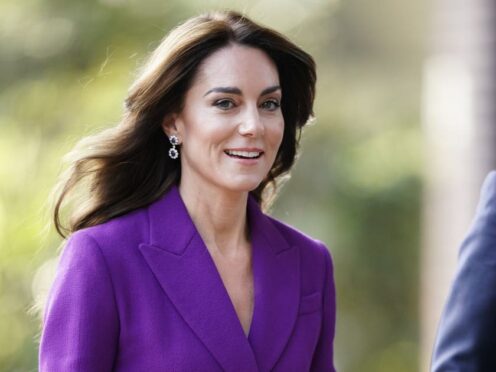
The Princess of Wales is said to be “excited” by her business taskforce’s new report that claims the UK could reap £45.5 billion in economic benefits if firms prioritise early childhood.
Kate, who is undergoing chemotherapy after a cancer diagnosis, has been following the work of chief executives she convened last year to galvanise business action on the importance of the formative years of a child’s development.
The Royal Foundation Business Taskforce for Early Childhood has produced a report recommending a range of interventions from creating a culture inside and outside firms that prioritises childhood to supporting parents with greater resources and flexibility in the workplace.
Among the eight-member taskforce are the chief executives of Ikea, NatWest Group and Deloitte – and their report highlights how the nation could benefit from an estimated £45.5 billion.
It was fantastic to host Chief Executives of some of the UK’s biggest businesses at Kensington Palace as we reconvened The Royal Foundation Business Taskforce for Early Childhood. pic.twitter.com/sRcEvo0tDw
— The Royal Foundation Centre for Early Childhood (@Earlychildhood) January 15, 2024
The amount could be achieved by equipping youngsters with social and emotional skills, supporting parents wanting to return to work, and reducing the need to spend public funds on those who experienced difficult childhoods which might have been avoided through preventative action in early childhood.
The report follows the launch of Kate’s long-term campaign Shaping Us in January last year, described as the princess’ “life’s work”, and aimed at highlighting the crucial first five years of a child’s life.
Christian Guy, executive director of the Royal Foundation Centre for Early Childhood, briefed Kate on the new report she has read, and said she was “excited” by the document.
He said: “Shaping Us was about awareness but also for her it’s so important to have action.
“So to have eight of the most significant businesses in Britain come forward, make the case to their fellow business leaders is vital – it’s exciting for her and it’s a priority going forward for our centre’s work.”

Mr Guy added: “This is another crucial moment for Her Royal Highness’ early childhood work because its impact, and the work of her Centre for Early Childhood, is rolling on as she recovers.”
A Kensington Palace spokesman stressed the launch did not signal Kate “returning to work” and said “…early childhood is a huge priority for the Princess of Wales, and she has been kept fully up to date throughout the process and the development of the task force’s work and she has seen the report…”
The princess has been working to raise the profile of the early years development of children for some years and established her centre in 2021 as part of the Royal Foundation of the Prince and Princess of Wales.
Emma Franklin, a director of consulting with Deloitte which produced the taskforce’s report, said: “investing in social and emotional skills for the under-fives”, known as “soft skills” and associated with resilience, problem solving and empathy, “we could see a productivity gain of about £12.2 billion over the course of a generation.”
She said: “And then we also look at the opportunity to encourage parents and caregivers to get back into the workforce if they had access to more suitable childcare opportunities, and that figure comes in at around 17.2 billion.”
Ms Franklin, who worked on the report, added: “Finally, we look at the public expenditure currently around mitigating adverse childhood experiences, so children that suffer from neglect and abuse, and if we were able to reduce some of that it comes in around £16.1 billion and the three figure total together equates to a £45.5 billion net gain for the UK economy.”
She explained the team that produced the report consulted with the early years sector, businesses, academics and others, and the document identified “five opportunities for impact” that businesses of all sizes could follow.
These are building a culture that prioritises early childhood, helping disadvantaged families access support, providing parents with greater resources and flexibility with their work, nurturing children’s social and emotional skills and backing initiatives that increase access to affordable early childhood education.

Enjoy the convenience of having The Sunday Post delivered as a digital ePaper straight to your smartphone, tablet or computer.
Subscribe for only £5.49 a month and enjoy all the benefits of the printed paper as a digital replica.
Subscribe